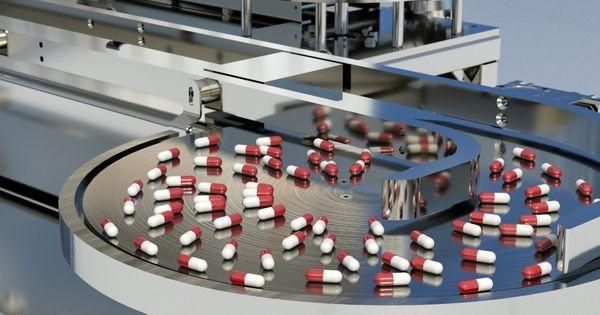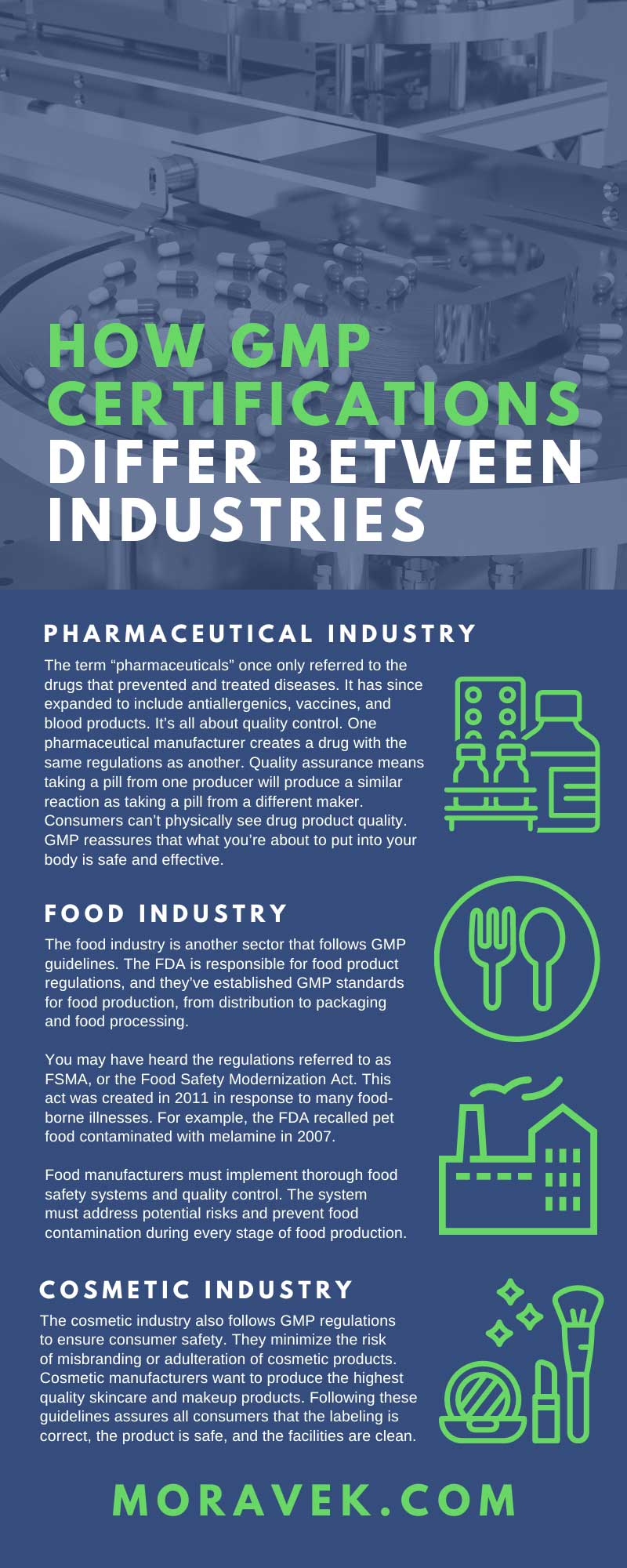
Food safety affects everyone. You may or may not have heard of the acronym GMP. It’s a system that ensures products meet strict standards. A lot goes into it, and different industries utilize GMP certifications.
The Food and Drug Administration (FDA) enforces GMP and conducts inspections to ensure compliance is taken seriously. Continue reading to explore a more in-depth look into GMP certifications and how GMP certifications differ between industries.
Get To Know GMP
GMP, or Good Manufacturing Practices, is a system of quality standards ensuring produced and controlled manufactured products, like pharmaceuticals, cosmetics, and food. A manufacturer must follow a set of procedures, documentation, and processes in order to keep its GMP certification. GMP regulations address the following problem areas:
- Cleanliness
- Record keeping
- Process validation
- Sanitation
- Equipment verification
- Personnel qualifications
- Complaint handling
GMP reduces a company’s waste production and losses and helps them avoid fines, recalls, seizures, and jail time. To protect the manufacturer from errors and devastating risks, GMP spans all aspects of the manufacturing process. These dangers include mislabeling, cross-contamination, and adulteration.
Specific areas can influence the quality and safety of GMP-regulated products. These areas include personnel, complaints, equipment, and quality management.
cGMP Versus GMP
In most cases, you can use cGMP and GMP interchangeably. cGMP stands for current Good Manufacturing Practices. The FDA wants to achieve the highest quality standards through updated technology and systems, so it implemented cGMP to guarantee continuous improvement in the area.
Industries and GMP
The first GMP standards were developed for drug manufacturers and printed in 1968. Over the years, these guidelines have undergone several revisions to stay relevant, and many pharmaceutical manufacturers use them. Nowadays, many other industries also use these guidelines.
Pharmaceutical Industry
The term “pharmaceuticals” once only referred to the drugs that prevented and treated diseases. It has since expanded to include antiallergenics, vaccines, and blood products. It’s all about quality control. One pharmaceutical manufacturer creates a drug with the same regulations as another. Quality assurance means taking a pill from one producer will produce a similar reaction as taking a pill from a different maker.
Consumers can’t physically see drug product quality. GMP reassures that what you’re about to put into your body is safe and effective.
Food Industry
The food industry is another sector that follows GMP guidelines. The FDA is responsible for food product regulations, and they’ve established GMP standards for food production, from distribution to packaging and food processing.
You may have heard the regulations referred to as FSMA, or the Food Safety Modernization Act. This act was created in 2011 in response to many food-borne illnesses. For example, the FDA recalled pet food contaminated with melamine in 2007.
Food manufacturers must implement thorough food safety systems and quality control. The system must address potential risks and prevent food contamination during every stage of food production.
Food manufacturers must also follow GMP regulations with the USDA (United States Department of Agriculture).
Cosmetic Industry
The cosmetic industry also follows GMP regulations to ensure consumer safety. They minimize the risk of misbranding or adulteration of cosmetic products. Cosmetic manufacturers want to produce the highest quality skincare and makeup products. Following these guidelines assures all consumers that the labeling is correct, the product is safe, and the facilities are clean.
Why GMPs are Important
Is it really necessary to have all these regulations and rules in place? Here’s another question to ponder: Do you wonder whether the pill or piece of food you’re about to consume is safe? It’s not something you have to think about because of the standards in place with GMPs.
They ensure product quality for items that could cause significant harm if they’re not safe or effective. Individuals can confidently consume foods and pills, and the standards transfer to other aspects of the manufacturing process.
Five Components of GMP
GMP focuses on five main components. Manufacturers refer to them as the “Five P’s.”
Processes
Manufacturing companies must document processes consistently and properly and distribute them to employees. They conduct regular evaluations to ensure all staff comply with the current procedures and meet the required organization standards.
Auditors will regularly inspect facilities and laboratories for quality and consistency. Frequent inspections and evaluations are vital for compliance.
Products
All materials used in the manufacturing process must be of the highest quality. Products must endure constant comparison, testing, and quality assurance before reaching customers. Every production stage has clear specifications to follow, and manufacturers must follow standard methods for testing, packing, and allocating sample products.
Premises
Premises refer to locations and buildings. Manufacturers must maintain equipment, facilities, and laboratories to ensure sanitary, safe, and efficient manufacturing conditions.
Proper cleaning and storage will prevent accidents, cross-contamination, and fatalities. Perform timely repairs, and lower the risk of equipment failure with routine cleaning. The end goal is to reduce product variations to protect employees, consumers, and patients from operational problems.
People
Since all team members must adhere to strict manufacturing regulations and processes, you need to ensure you’re hiring well-qualified employees. Train staff to follow proper labeling, record keeping, equipment handling, and sanitation practices. Certain GMP training courses help staff understand their responsibilities and roles completely. They will learn to assess their performance, boosting team members’ competency, efficiency, and productivity.
Procedures
Procedures and processes go hand in hand. A procedure is a set of guidelines for undertaking an integrated approach to achieve a consistent result. It should be well-laid out to ensure all staff members follow it regularly.
Manufacturing procedures are incredibly scrutinized during audits. Using outdated technology will put the manufacturer at risk for noncompliance penalties, but consistency can alleviate this issue. Ensure all staff members understand the procedures set in place.
GMP certifications are incredibly important for different industries to follow. If you’re looking for a trusted custom chemical synthesis company,consider Moravek. We are a GMP-certified company that provides custom synthesis of stable-labeled, radiolabeled, and non-labeled compounds in non-clinical and clinical research. Our incredible experience and expert project management make us leaders in the industry. We’re here to help you put together an efficient campaign.

